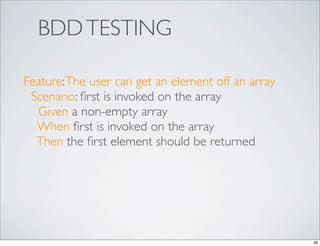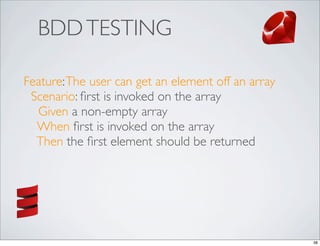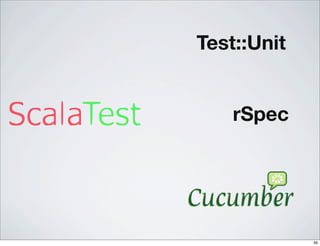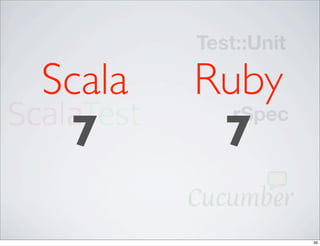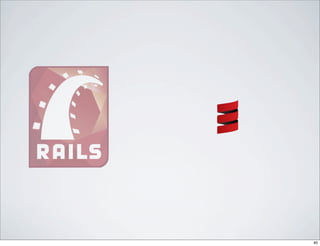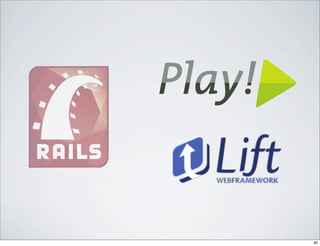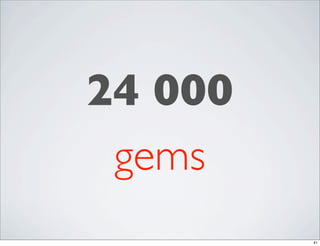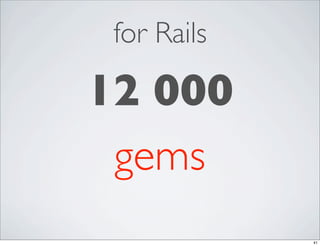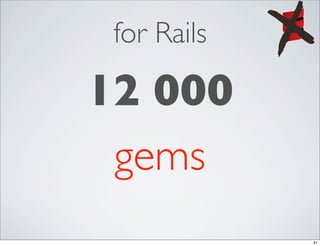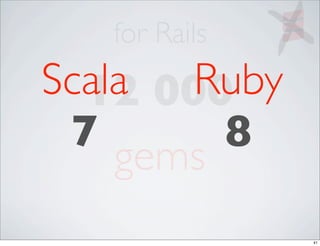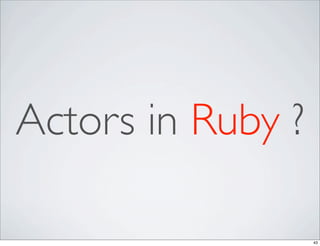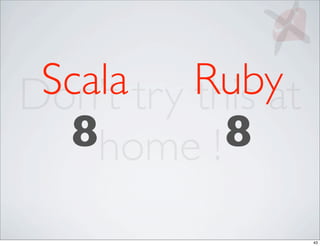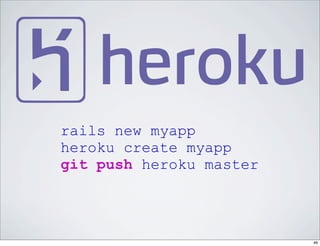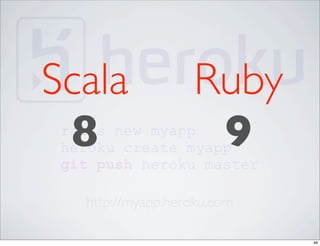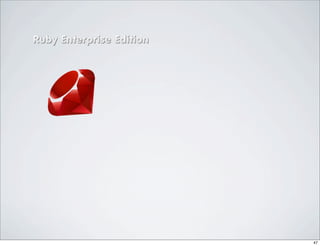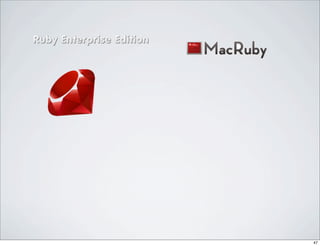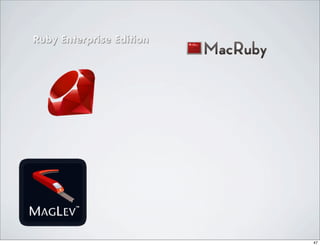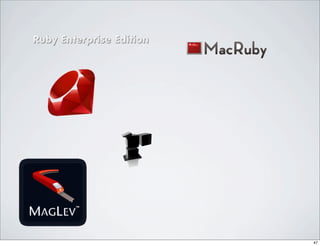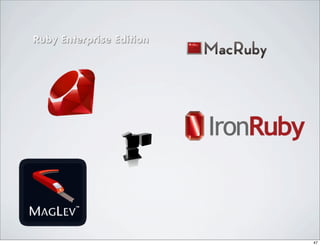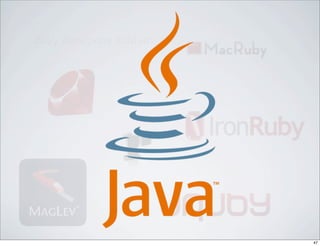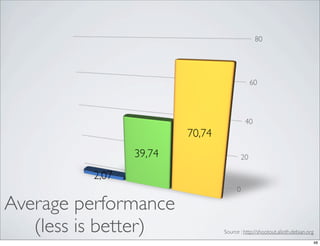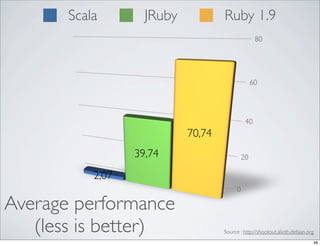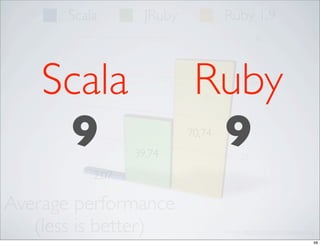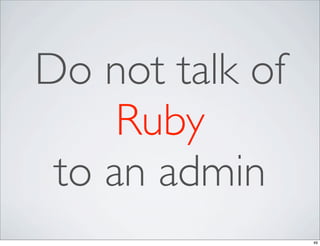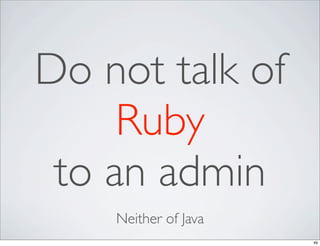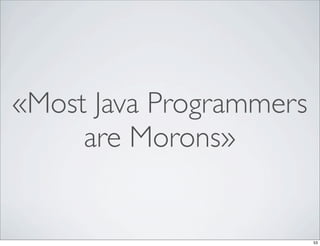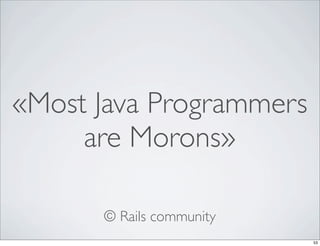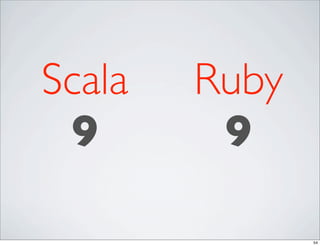Scala vs Ruby
- 1. SCALA VS RUBY Rémy-Christophe Schermesser rcs@octo.com @El_Picador 1
- 2. 2
- 3. 3
- 4. 4
- 5. 5
- 6. 6
- 7. 7
- 8. <relationships> <ejb-relation> <ejb-relation-name>a-b</ejb-relation-name> <ejb-relationship-role> <!-- A => B --> <ejb-relationship-role-name>a2b</ejb- relationship-role-name> <multiplicity>One</multiplicity> <relationship-role-source> <ejb-name>A</ejb-name> </relationship-role-source> <cmr-field> <cmr-field-name>b</cmr-field-name> </cmr-field> </ejb-relationship-role> <ejb-relationship-role> <!-- B => A --> <ejb-relationship-role-name>b2a</ejb- relationship-role-name> <multiplicity>One</multiplicity> <relationship-role-source> <ejb-name>B</ejb-name> </relationship-role-source> </ejb-relationship-role> </ejb-relation> </relationships> 8
- 9. 9
- 10. Functional programming 10
- 11. Functional APIs programming 10
- 12. Functional APIs programming gems 10
- 13. Functional APIs programming Easy to use gems 10
- 14. 11
- 15. Functional programming ? 12
- 16. Functional programming ? 12
- 17. Functional APIs ? programming ? 12
- 18. Functional APIs ? programming ? 12
- 19. Functional APIs ? programming ? gems ? 12
- 20. Functional APIs ? programming ? gems ? 12
- 21. Functional APIs ? programming ? Easy to use ? gems ? 12
- 22. Functional APIs ? programming ? Easy to use ? gems ? 12
- 23. VS 13
- 24. FIGHT VS 13
- 25. DRAW VS Sort of ... 13
- 26. WHY A DRAW ? 14
- 27. WHY A DRAW ? let’s talk about languages 14
- 28. WHY A DRAW ? let’s talk about languages let’s frameworkise 14
- 29. WHY A DRAW ? let’s talk about languages let’s frameworkise let’s deploy 14
- 30. WHY A DRAW ? let’s talk about languages let’s frameworkise let’s deploy let’s meet people 14
- 31. 15
- 32. LET’S TALK ABOUT LANGUAGES 15
- 33. 16
- 34. THE BEST THING ABOUT SCALA & RUBY 16
- 35. No at the end of lines 17
- 36. No ; at the end of lines 17
- 37. Scala No Ruby 1 ; 1 at the end of lines 17
- 38. 18
- 39. λ 18
- 40. list.filter(_ % 2 == 0) list.filter { e: Int => (e % 2 == 0)) } 19
- 41. list.filter(_ % 2 == 0) list.filter { e: Int => (e % 2 == 0)) } list.select do |e| e % 2 == 0 end 19
- 42. list.filter(_ % 2 == 0) Scala list.filter { } Ruby e: Int => (e % 2 == 0)) 2 2 list.select do |e| e % 2 == 0 end 19
- 43. TYPES ! 20
- 44. TYPES ! STATIC 20
- 45. TYPES ! STATIC var hash = new HashMap[Int, String] 20
- 46. TYPES ! STATIC var hash = new HashMap[Int, String] hash = Hash.new hash = 3 20
- 47. TYPES ! STATIC var hash = new HashMap[Int, String] hash = Hash.new hash = 3 20
- 48. TYPES ! STATIC Scala Ruby 2 2 var hash = new HashMap[Int, String] hash = Hash.new hash = 3 20
- 49. PATTERN MATCHING 21
- 50. PATTERN MATCHING def matchTest(x: Any): Any = x match { case 1 => "one" case "two" => 2 case y: Int => "scala.Int" case 2 :: tail => tail } 21
- 51. gem install case 22
- 52. gem install case require 'case' def matchTest x case x when 1 "one" when "two" 2 when Case::All[Integer] "ruby.Integer" when Case::Array[2, Case::Any] x[1..-1] end end 22
- 53. gem install case require 'case' def matchTest x case x when 1 "one" when "two" 2 when Case::All[Integer] "ruby.Integer" when Case::Array[2, Case::Any] x[1..-1] end end 22
- 54. gem install case require 'case' Scala def matchTest x case x when 1 Ruby 3 2 "one" when "two" 2 when Case::All[Integer] "ruby.Integer" when Case::Array[2, Case::Any] x[1..-1] end end 22
- 55. MONKEY PATCHING 23
- 56. puts "a".to_s # => a 24
- 57. puts "a".to_s # => a class String def to_s "Monkey !" end def my_method "Patch !" end end 24
- 58. puts "a".to_s # => a class String def to_s "Monkey !" end def my_method "Patch !" end end puts "a".to_s # => Monkey ! 24
- 59. puts "a".to_s # => a class String def to_s "Monkey !" end def my_method "Patch !" end end puts "a".to_s # => Monkey ! puts "a".my_method # => Patch ! 24
- 60. 25
- 61. Implicit ! 25
- 62. Implicit ! class MySuperString(original: String) { def myMethod = "Patch !" } 25
- 63. Implicit ! class MySuperString(original: String) { def myMethod = "Patch !" } implicit def string2super(x: String) = new MySuperString(x) 25
- 64. Implicit ! class MySuperString(original: String) { def myMethod = "Patch !" } implicit def string2super(x: String) = new MySuperString(x) println("a".myMethod) // => Patch ! 25
- 65. Implicit ! Scala Ruby class MySuperString(original: String) { } def myMethod = "Patch !" 3 3 implicit def string2super(x: String) = new MySuperString(x) println("a".myMethod) // => Patch ! 25
- 66. Dynamic calls 26
- 67. Dynamic calls class Animal def method_missing name, *args if args.empty? puts "Animal says " + name.to_s else puts "Animal wants to " + name.to_s + args.join(", ") end self end end 26
- 68. Dynamic calls class Animal def method_missing name, *args if args.empty? puts "Animal says " + name.to_s else puts "Animal wants to " + name.to_s + args.join(", ") end self end end animal = Animal.new animal.qualk # => Animal says : qualks ! animal.say("hello") # => Animal wants to say hello 26
- 69. 27
- 70. Scala 2.9 27
- 71. Scala 2.9 class Animal extends Dynamic { def _select_(name: String) = println("Animal says " + name) def _invoke_(name: String, args: Any*) = { println("Animal wants to " + name + args.mkString(", ")) this } } 27
- 72. Scala 2.9 class Animal extends Dynamic { def _select_(name: String) = println("Animal says " + name) def _invoke_(name: String, args: Any*) = { println("Animal wants to " + name + args.mkString(", ")) this } } val animal = new Animal animal.qualk // => Animal says qualk animal.say("hello") // => Animal wants to say hello 27
- 73. Scala 2.9 class Animal extends Dynamic { def _select_(name: String) = println("Animal says " + name) def _invoke_(name: String, args: Any*) = { println("Animal wants to " + name + args.mkString(", ")) this } } val animal = new Animal animal.qualk // => Animal says qualk animal.say("hello") // => Animal wants to say hello 27
- 74. Scala 2.9 Scala class Animal extends Dynamic { Ruby def _select_(name: String) = println("Animal says " + name) def _invoke_(name: String, args: Any*) = { 4 4 println("Animal wants to " + name + args.mkString(", ")) this } } val animal = new Animal animal.qualk // => Animal says qualk animal.say("hello") // => Animal wants to say hello 27
- 75. Traits ! trait PimpMyClass { def myMethod = println("myMethod") } class IncludeTrait extends PimpMyClass (new IncludeTrait).myMethod 28
- 76. Traits ! trait PimpMyClass { def myMethod = println("myMethod") } class IncludeTrait extends PimpMyClass (new IncludeTrait).myMethod 28
- 77. Modules ! module PimpMyClass def my_method puts "my_method" end end class IncludeModule include PimpMyClass end IncludeModule.new.my_method 29
- 78. Modules ! Scala module PimpMyClass def my_method Ruby puts "my_method" 5 5 end end class IncludeModule include PimpMyClass end IncludeModule.new.my_method 29
- 79. DUCK TYPING 30
- 80. DUCK TYPING It quacks ! 30
- 81. DUCK TYPING It quacks ! It walks ! 30
- 82. DUCK TYPING It quacks ! It walks ! 30
- 83. class Duck def quack; end def walk; end end 31
- 84. class Duck def quack; end def walk; end class Platypus end def quack; end def walk; end end 31
- 85. class Duck def quack; end def walk; end class Platypus end def quack; end def walk; end end def act_as_a_duck animal animal.quack animal.walk end 31
- 86. class Duck def quack; end def walk; end class Platypus end def quack; end def walk; end end def act_as_a_duck animal animal.quack animal.walk duck = Duck.new end platypus = Platypus.new act_as_a_duck(duck) act_as_a_duck(platypus) 31
- 87. class Duck { def quack = ... def walk = ... } 32
- 88. class Duck { def quack = ... def walk = ... class Platypus { } def quack = ... def walk = ... } 32
- 89. class Duck { def quack = ... def walk = ... class Platypus { } def quack = ... def walk = ... } def ActAsADuck(a: { def quack; def walk })= { a.quack a.walk } 32
- 90. class Duck { def quack = ... def walk = ... class Platypus { } def quack = ... def walk = ... } def ActAsADuck(a: { def quack; def walk })= { a.quack a.walk } val duck = new Duck val platypus = new Platypus ActAsADuck(duck) ActAsADuck(platypus) 32
- 91. class Duck { def quack = ... def walk = ... Scala Ruby class Platypus { } def quack = ... def walk = ... } } 6 a.quack a.walk 6 def ActAsADuck(a: { def quack; def walk })= { val duck = new Duck val platypus = new Platypus ActAsADuck(duck) ActAsADuck(platypus) 32
- 92. ≃ 33
- 93. ≃ Only learn the syntax 33
- 94. 34
- 95. LET’S FRAMEWORKISE 34
- 96. 35
- 97. Test::Unit rSpec 35
- 98. UNIT TESTING 36
- 99. test "my test" do array = [1, 2, 3] assert_equal 1, array.first end UNIT TESTING 36
- 100. test "my test" do array = [1, 2, 3] assert_equal 1, array.first end UNIT TESTING @Test def myTest() { val array = List(1, 2, 3) assert(array(0) === 1) } 36
- 101. SPEC TESTING 37
- 102. describe "Get of Array" do it "first returns the first element" do array = [1, 2, 3] array.first.should == 1 end end SPEC TESTING 37
- 103. describe "Get of Array" do it "first returns the first element" do array = [1, 2, 3] array.first.should == 1 end end SPEC TESTING describe("Get of List") { it("(0) returns the first element") { val array = List(1, 2, 3) array(0) should be 1 } } 37
- 104. BDD TESTING Feature: The user can get an element off an array Scenario: first is invoked on the array Given a non-empty array When first is invoked on the array Then the first element should be returned 38
- 105. BDD TESTING Feature: The user can get an element off an array Scenario: first is invoked on the array Given a non-empty array When first is invoked on the array Then the first element should be returned 38
- 106. Test::Unit rSpec 39
- 107. Test::Unit Scala Ruby rSpec 7 7 39
- 108. 40
- 109. 40
- 110. 40
- 111. 40
- 112. 41
- 113. 24 000 gems 41
- 114. for Rails 12 000 gems 41
- 115. for Rails 12 000 gems 41
- 116. for Rails Scala 000 12 Ruby 7 8 gems 41
- 117. 42
- 118. Actors in Ruby ? 43
- 119. Don’t try this at home ! 43
- 120. Scala try Ruby Don’t this at 8home ! 8 43
- 121. 44
- 122. 45
- 123. LET’S DEPLOY 45
- 124. 46
- 125. rails new myapp heroku create myapp git push heroku master 46
- 126. rails new myapp heroku create myapp git push heroku master http://myapp.heroku.com 46
- 127. Scala Ruby 8 rails new myapp heroku create myapp9 git push heroku master http://myapp.heroku.com 46
- 128. 47
- 129. 47
- 130. 47
- 131. 47
- 132. 47
- 133. 47
- 134. 47
- 135. 47
- 136. 80 60 40 70,74 39,74 20 2,07 0 Average performance (less is better) Source : http://shootout.alioth.debian.org 48
- 137. Scala JRuby Ruby 1.9 80 60 40 70,74 39,74 20 2,07 0 Average performance (less is better) Source : http://shootout.alioth.debian.org 48
- 138. Scala JRuby Ruby 1.9 80 Scala Ruby 60 9 39,74 9 70,74 20 40 2,07 0 Average performance (less is better) Source : http://shootout.alioth.debian.org 48
- 139. Do not talk of Ruby to an admin 49
- 140. Do not talk of Ruby to an admin Neither of Java 49
- 141. 50
- 142. LET’S MEET PEOPLE 50
- 143. 51
- 144. 51
- 145. 52
- 146. 52
- 147. «Most Java Programmers are Morons» 53
- 148. «Most Java Programmers are Morons» © Rails community 53
- 149. Scala Ruby 9 9 54
- 150. ? ? 55
- 151. ? ? 55
- 152. 56
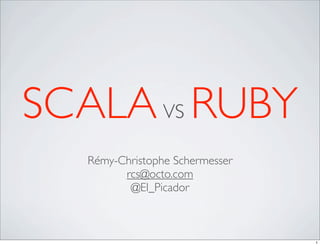


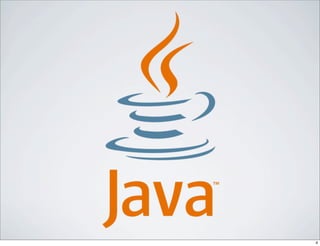

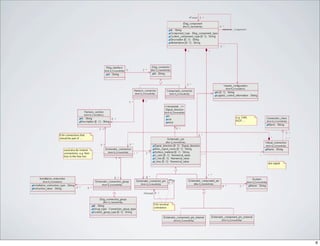

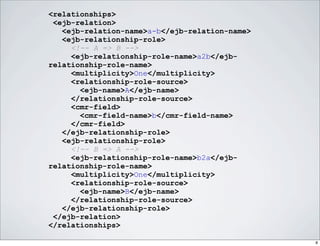
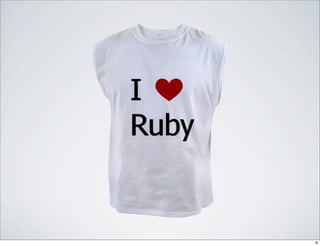
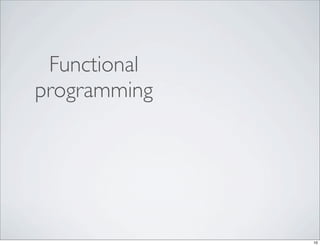
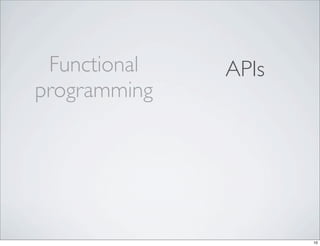
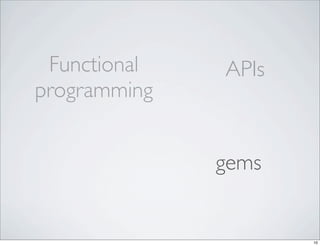
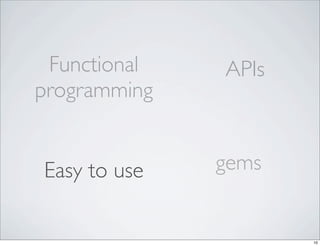

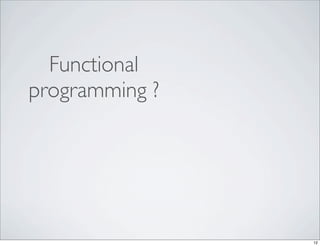

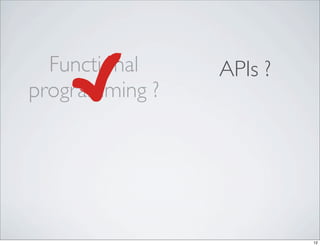
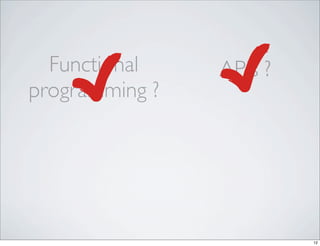
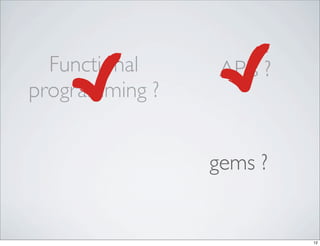
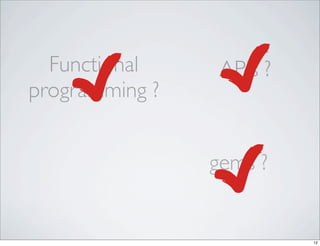
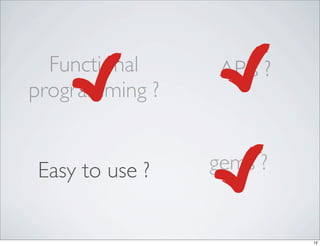
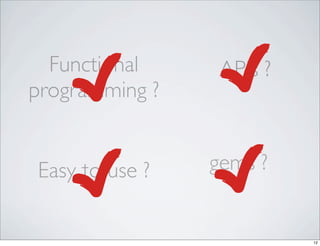
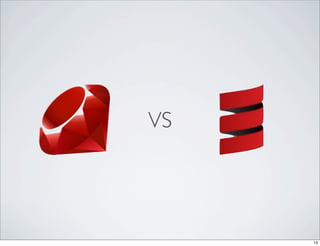




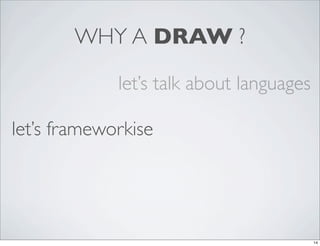
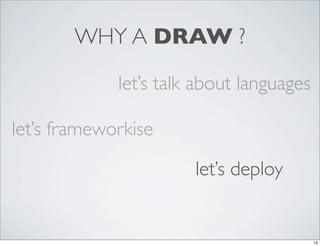
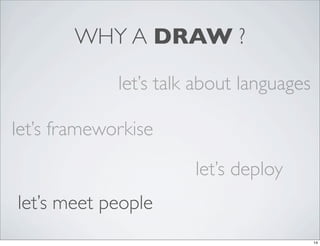

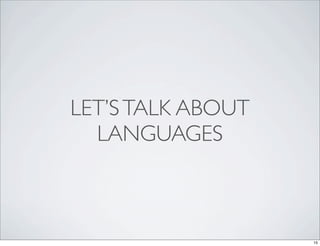




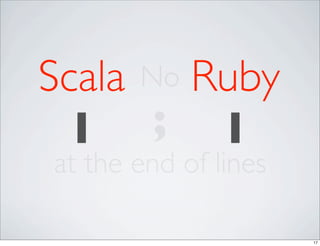

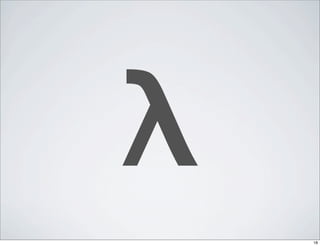
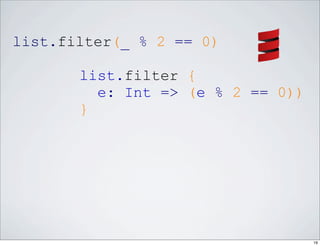
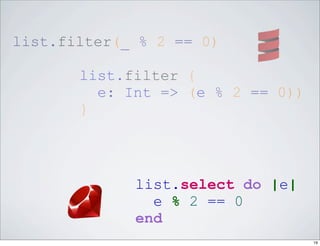
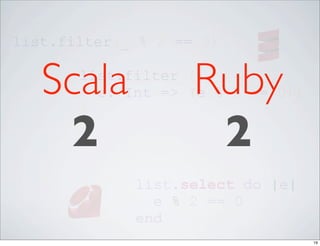
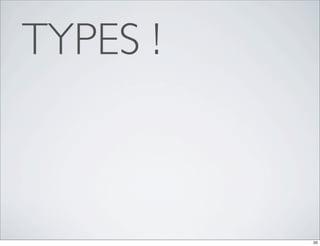
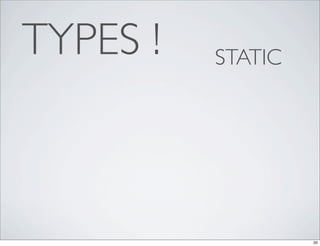
![TYPES ! STATIC
var hash =
new HashMap[Int, String]
20](https://image.slidesharecdn.com/scaladays-110608051827-phpapp02/85/Scala-vs-Ruby-45-320.jpg)
![TYPES ! STATIC
var hash =
new HashMap[Int, String]
hash = Hash.new
hash = 3
20](https://image.slidesharecdn.com/scaladays-110608051827-phpapp02/85/Scala-vs-Ruby-46-320.jpg)
![TYPES ! STATIC
var hash =
new HashMap[Int, String]
hash = Hash.new
hash = 3
20](https://image.slidesharecdn.com/scaladays-110608051827-phpapp02/85/Scala-vs-Ruby-47-320.jpg)
![TYPES ! STATIC
Scala Ruby
2 2
var hash =
new HashMap[Int, String]
hash = Hash.new
hash = 3
20](https://image.slidesharecdn.com/scaladays-110608051827-phpapp02/85/Scala-vs-Ruby-48-320.jpg)
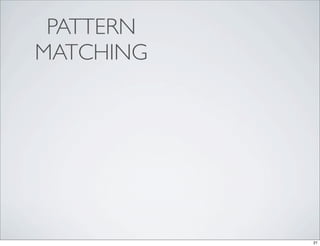
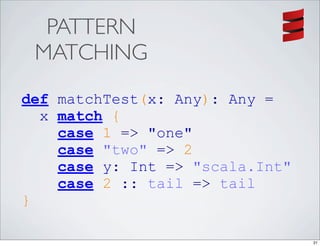
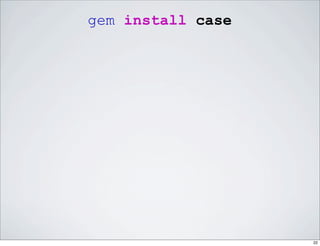
![gem install case
require 'case'
def matchTest x
case x
when 1
"one"
when "two"
2
when Case::All[Integer]
"ruby.Integer"
when Case::Array[2, Case::Any]
x[1..-1]
end
end
22](https://image.slidesharecdn.com/scaladays-110608051827-phpapp02/85/Scala-vs-Ruby-52-320.jpg)
![gem install case
require 'case'
def matchTest x
case x
when 1
"one"
when "two"
2
when Case::All[Integer]
"ruby.Integer"
when Case::Array[2, Case::Any]
x[1..-1]
end
end
22](https://image.slidesharecdn.com/scaladays-110608051827-phpapp02/85/Scala-vs-Ruby-53-320.jpg)
![gem install case
require 'case'
Scala
def matchTest x
case x
when 1
Ruby
3 2
"one"
when "two"
2
when Case::All[Integer]
"ruby.Integer"
when Case::Array[2, Case::Any]
x[1..-1]
end
end
22](https://image.slidesharecdn.com/scaladays-110608051827-phpapp02/85/Scala-vs-Ruby-54-320.jpg)

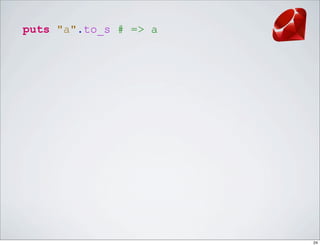
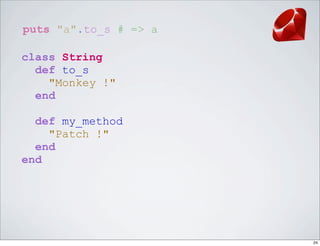
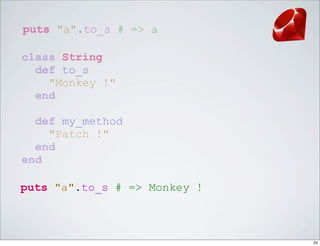
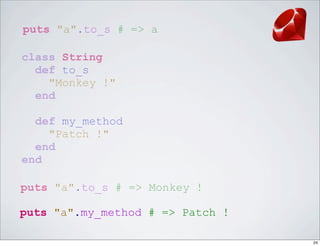

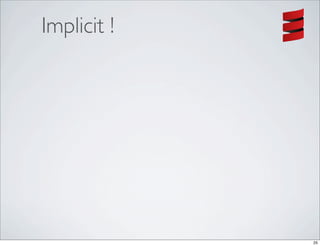
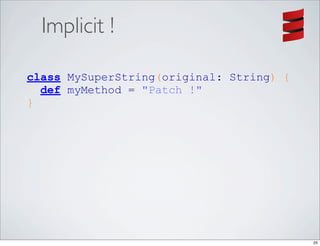
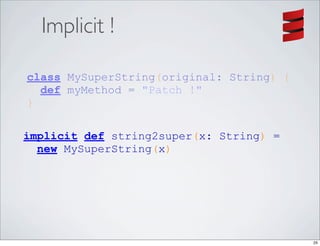
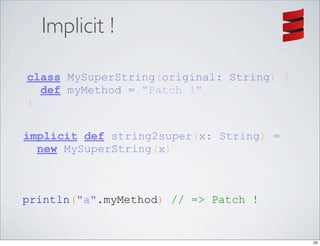
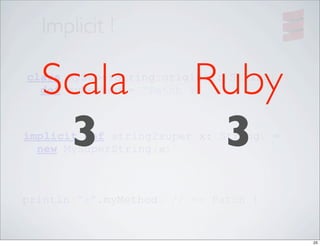

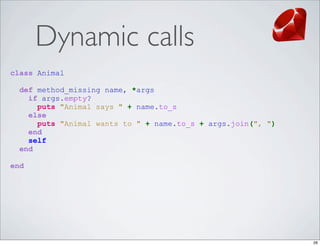
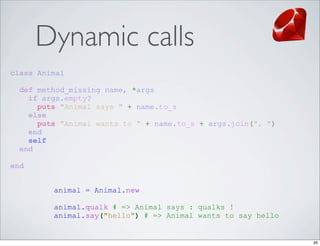

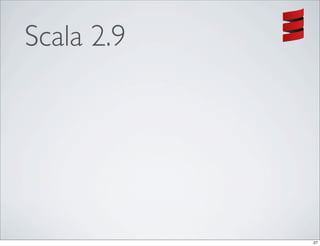
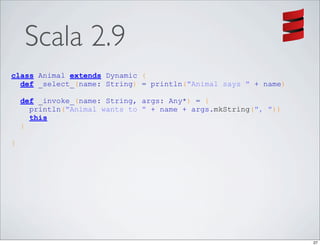
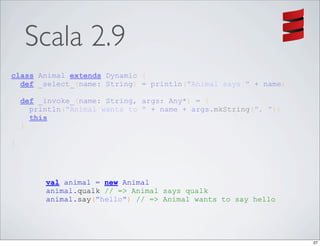
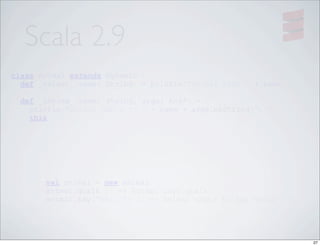
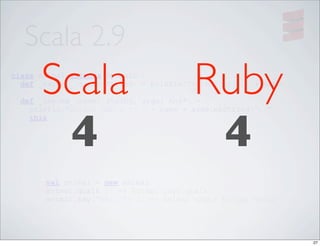
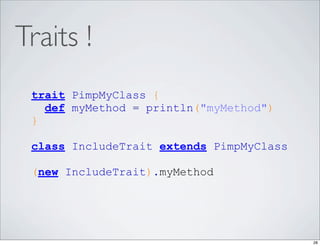
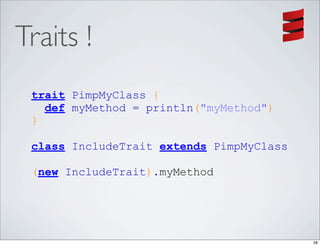
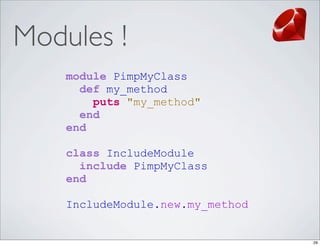
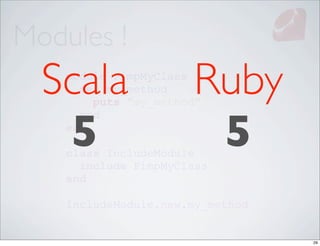
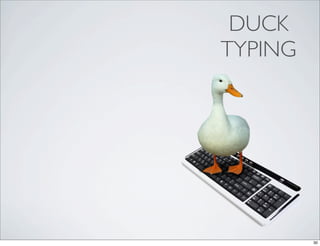
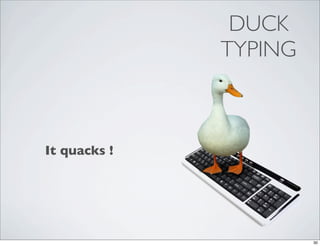
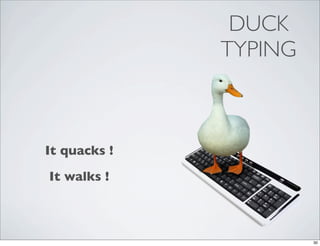
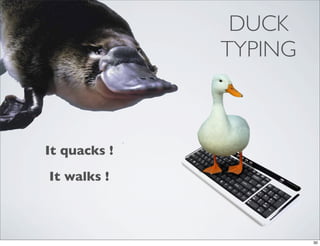
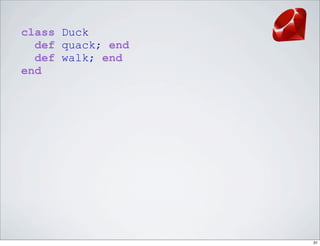
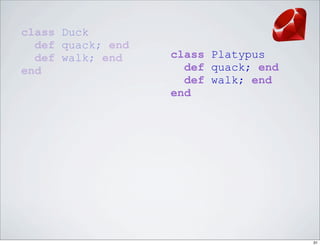
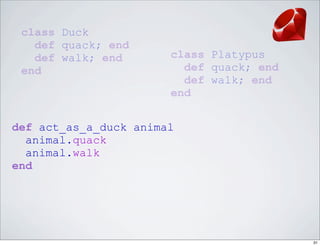
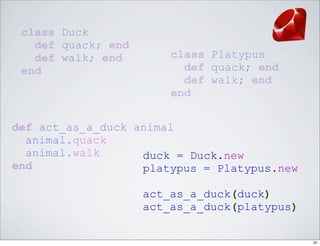
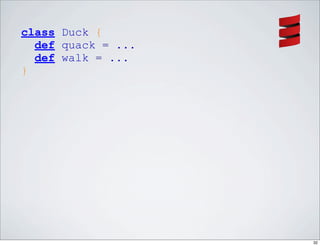
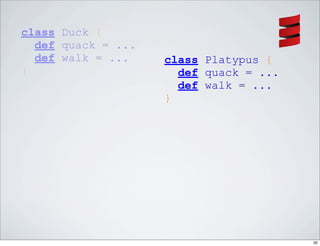
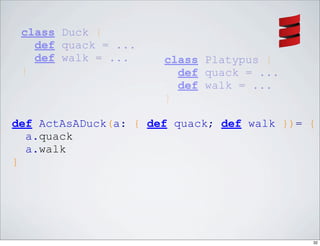
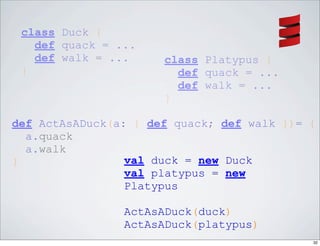
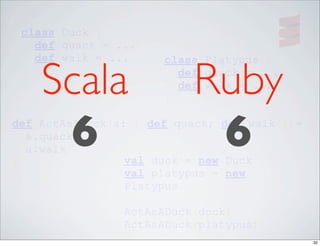
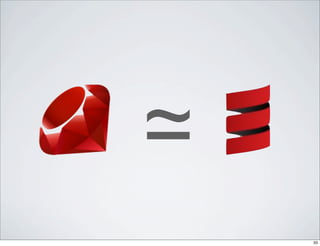
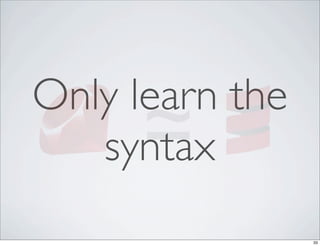


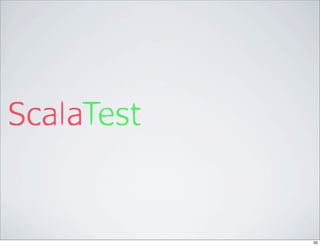
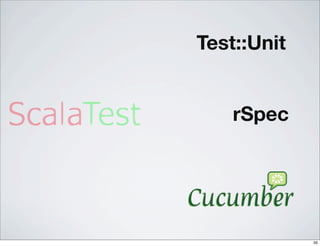
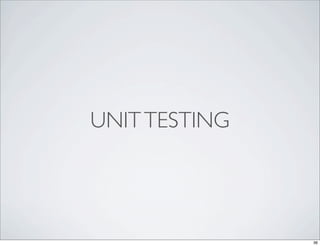
![test "my test" do
array = [1, 2, 3]
assert_equal 1, array.first
end
UNIT TESTING
36](https://image.slidesharecdn.com/scaladays-110608051827-phpapp02/85/Scala-vs-Ruby-99-320.jpg)
![test "my test" do
array = [1, 2, 3]
assert_equal 1, array.first
end
UNIT TESTING
@Test def myTest() {
val array = List(1, 2, 3)
assert(array(0) === 1)
}
36](https://image.slidesharecdn.com/scaladays-110608051827-phpapp02/85/Scala-vs-Ruby-100-320.jpg)

![describe "Get of Array" do
it "first returns the first element" do
array = [1, 2, 3]
array.first.should == 1
end
end
SPEC TESTING
37](https://image.slidesharecdn.com/scaladays-110608051827-phpapp02/85/Scala-vs-Ruby-102-320.jpg)
![describe "Get of Array" do
it "first returns the first element" do
array = [1, 2, 3]
array.first.should == 1
end
end
SPEC TESTING
describe("Get of List") {
it("(0) returns the first element") {
val array = List(1, 2, 3)
array(0) should be 1
}
}
37](https://image.slidesharecdn.com/scaladays-110608051827-phpapp02/85/Scala-vs-Ruby-103-320.jpg)
